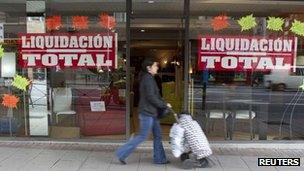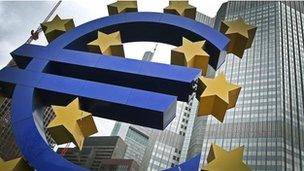Davos 2013: Is the worst of the eurozone crisis over?
- Published
- comments

Spain's economy still faces major problems
Is it all over? That is a question that will be lurking in the sidelines of the World Economic Forum in Davos this week - though I wonder who will be brave enough to say it out loud.
After three years of fearing the worst, there's a feeling among the movers and shakers here that the cloud has finally lifted. They are starting instead to hope for the best, despite a lecture from Christine Lagarde about the risks of a "relapse".
The optimism about the survival of the euro might be well placed. But the latest GDP figures from Spain, and the IMF's new forecasts for the region as a whole, are a reminder that the existential threat hanging over the single currency was only ever the most eye-catching element of the crisis in Europe.
Enormous economic problems remain, and in many parts of the continent, they are going to get worse before they get better.
The Spanish economy is now 6% smaller than it was before the crisis, and it is still shrinking. Today we found out that it had shrunk by another 0.6% in the last three months of 2012. That's the fifth quarterly decline in a row, and the worst since the spring of 2009.
You see the same tension in the IMF's latest economic update, which cuts the growth forecast for most European countries in 2013 and 2014, even as it talks about the increasing confidence in financial markets, and the fall in the cost of borrowing for countries like Spain since the old (higher) forecasts were written in September.
We have spent most of the eurozone crisis worrying about the great disconnect between the speed of financial markets - and the speed of Europe's politicians. Investors, it was said, wanted reform on a timetable that politicians could not hope to match.
But right now, I would say the problem is rather different. In the past six months, financial markets have shown themselves willing to give governments the benefit of an enormous amount of doubt. The question now is whether voters are willing to be equally patient, in waiting for the real economy to catch up.

The ECB's pledge to stand behind eurozone governments has yet to be tested
There are those who find the financial markets' new confidence rather surprising. Why? Because - with one big exception - Europe's basic approach to resolving the crisis has barely changed since last summer.
The exception, of course, is that promise by the European Central Bank (ECB) to stand behind eurozone governments in trouble, under certain carefully delineated circumstances.
Optimists say that has turned the eurozone crisis from an existential crisis into a more standard financial and economic crisis, not so very different from the crisis that the UK and the US are still labouring to put behind them.
On this view, the eurozone has a lot of problems, but at least it does not now have the added problems associated with being a currency area without a true lender of last resort.
Perhaps. But, even if you think that's true. The ECB's promise has yet to be tested.
Many in Europe, including the Spanish finance minister and most German officials, would rather it were not tested. They think the success of the ECB's promise of "Outright Monetary Transactions" (or OMT) will be well demonstrated by it never having to be used. Failing that, they at least think it would be a very good thing if it did not have to be used this side of the German election in the autumn. Many in the ECB would rather not have to go through with it, either.
But the IMF and some in the financial markets (including at least one major ratings agency I have spoken to) take a very different view. They think the only way to really draw a line under the crisis is for Spain to be taken off the danger list.
And they think that will not happen unless it takes the steps needed to qualify for an official eurozone support programme (backed up by the ECB) - and actually gets one. Even if the funds themselves are never used.
This is a debate that is not going to get resolved here at Davos. But even the euro optimists can agree on one thing: Spain will be crucial to how this new, calmer phase of the eurozone crisis plays out.
Everyone can also agree that the reaction of ordinary voters to the economic pain that still lies ahead, for large parts of Europe, will be most important of all.
A positive, self-reinforcing cycle of confidence is now possible, with falling borrowing costs for governments eventually producing better real economic outcomes on the ground. Spain has seen its cost of borrowing fall by more than two percentage points since the summer. Interest rates have also fallen sharply in Italy and Portugal.
With luck, that will bring its own positive dynamic, and eurozone politicians will not face another "moment of truth" in the financial markets. But ordinary voters may have a long wait before the effects trickle down to them.